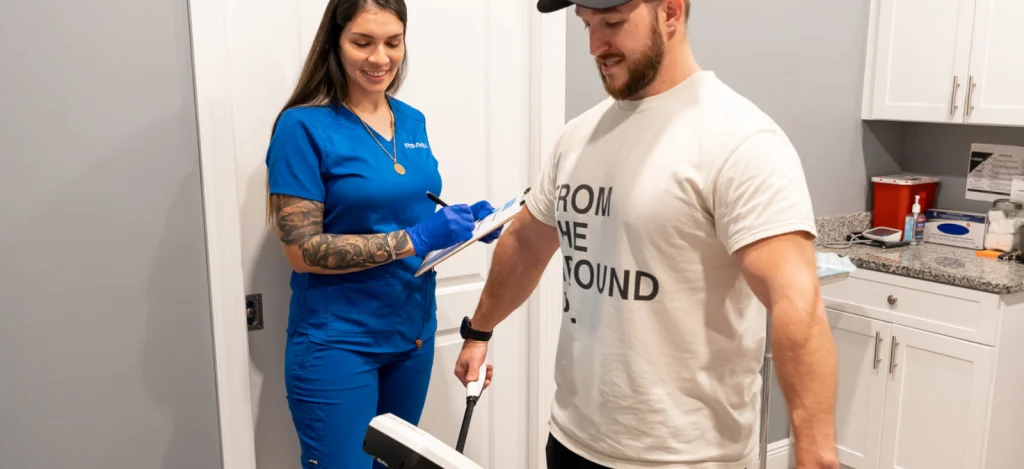Table of Contents
Introduction
In today’s society, where prioritizing optimal health and maintaining a healthy weight are paramount, the landscape of weight loss methodologies is constantly evolving. Amidst the multitude of choices, medical weight loss emerges as a beacon of hope, offering a scientifically validated path towards sustainable results. At Relive Hendersonville, we recognize the profound significance of effective weight management in bolstering overall health and vitality. Join us as we embark on a journey to unravel the intricacies of medical weight loss, exploring its underlying principles, myriad benefits, and transformative capabilities.
Understanding Medical Weight Loss
Defining Medical Weight Loss
Medical weight loss represents a holistic and evidence-based strategy for managing weight under the supervision of healthcare experts. Unlike traditional weight loss methods, medical weight loss employs a multifaceted approach tailored to individual needs. It integrates pharmaceutical interventions, nutritional guidance, and behavioral therapy to address the underlying factors contributing to weight gain and optimize long-term outcomes.
How Medical Weight Loss Differs from Conventional Methods
In contrast to conventional weight loss approaches that often emphasize diet and exercise alone, medical weight loss delves deeper into the complexities of obesity management. By considering factors such as metabolic health, hormonal imbalances, and psychological well-being, medical weight loss offers a comprehensive solution that goes beyond calorie restriction and physical activity. This personalized approach not only enhances the effectiveness of weight loss efforts but also fosters sustainable results, minimizing the likelihood of relapse.
The Science Behind Medical Weight Loss
Medical weight loss is rooted in a deep understanding of human physiology and metabolism, aiming to optimize bodily functions to facilitate sustainable weight loss. Here’s a closer look at the scientific principles that underpin medical weight loss interventions:
1. Metabolic Optimization
Medical weight loss strategies are designed to optimize metabolic processes within the body, ensuring that energy expenditure aligns with energy intake. Through careful assessment and analysis, healthcare professionals identify factors that may contribute to metabolic dysfunction, such as hormonal imbalances or insulin resistance. By addressing these underlying issues, medical weight loss interventions help recalibrate the body’s metabolic rate, enabling more efficient energy utilization and fat burning.
2. Appetite Regulation
Effective weight management requires controlling appetite and hunger cues to prevent overeating and promote adherence to a balanced diet. Medical weight loss interventions leverage medications and nutritional strategies to regulate appetite hormones such as leptin and ghrelin, which play crucial roles in signaling satiety and hunger, respectively. By modulating these hormones, medical weight loss practitioners help individuals achieve a caloric deficit without experiencing intense cravings or feelings of deprivation.
3. Fat Loss and Lean Muscle Preservation
Unlike crash diets that often result in muscle loss alongside fat reduction, medical weight loss prioritizes the preservation of lean muscle mass. This is achieved through a combination of dietary interventions, exercise regimens, and pharmacological agents that promote fat metabolism while preserving muscle tissue. By preserving lean muscle mass, individuals undergoing medical weight loss not only maintain metabolic health but also ensure long-term weight loss success and improve overall body composition.
4. Utilization of Medications and Behavioral Strategies
Medical weight loss interventions may incorporate the use of medications that target various aspects of weight regulation, such as appetite suppression, fat absorption inhibition, or metabolic enhancement. Additionally, behavioral strategies, including cognitive-behavioral therapy, mindfulness techniques, and habit formation, play a crucial role in modifying eating behaviors, managing stress, and promoting long-term adherence to healthy lifestyle habits. By combining pharmacological interventions with behavioral modification strategies, medical weight loss practitioners offer comprehensive support tailored to each individual’s unique needs and preferences.
The science behind medical weight loss is grounded in a multidisciplinary approach that integrates physiological principles, pharmaceutical interventions, and behavioral strategies to optimize metabolism, regulate appetite, promote fat loss, and preserve lean muscle mass. By harnessing these scientific principles, medical weight loss practitioners empower individuals to achieve sustainable weight loss and improve overall health and well-being.

The Benefits of Medical Weight Loss
Achieving Sustainable Results
Medical weight loss stands out for its emphasis on sustainable weight loss outcomes. Unlike fad diets or quick-fix solutions that often yield short-term results followed by weight regain, medical weight loss takes a comprehensive approach to address the root causes of obesity. By implementing evidence-based interventions and focusing on long-term behavior modification and lifestyle changes, medical weight loss programs empower individuals to achieve lasting success in their weight management journey. This sustainable approach not only leads to significant weight loss but also equips individuals with the tools and strategies needed to maintain their results over time.
Addressing Underlying Health Conditions
Beyond just shedding pounds, medical weight loss programs prioritize holistic health by addressing underlying medical conditions often associated with obesity. Conditions such as diabetes, hypertension, hyperlipidemia, and metabolic syndrome frequently coexist with excess weight and can significantly impact overall health and quality of life. Medical weight loss interventions are uniquely positioned to address these comorbidities through targeted treatments and comprehensive medical monitoring. By managing these underlying health conditions alongside weight loss efforts, individuals can experience improvements in overall health, reduce disease risk, and enhance well-being.
Personalized Approach to Weight Loss
One of the key advantages of medical weight loss is its personalized approach to treatment. Recognizing that each individual’s weight loss journey is unique, medical weight loss programs tailor treatment plans to meet the specific needs, preferences, and medical history of each patient. This individualized approach encompasses various aspects of weight management, including dietary recommendations, exercise prescriptions, medication regimens, and behavioral strategies. By customizing treatment plans to address the unique challenges and goals of each individual, medical weight loss programs maximize effectiveness and ensure optimal outcomes. This personalized care fosters a supportive and empowering environment in which individuals can achieve their weight loss goals with confidence and success.

The Medical Weight Loss Journey
Initial Consultation and Assessment
The medical weight loss journey begins with a thorough consultation and assessment conducted by our experienced healthcare team. During this initial visit, patients undergo a comprehensive medical evaluation, including a review of their medical history, current medications, and lifestyle factors.
Customized Treatment Plan Development
Based on the findings of the initial assessment, a personalized treatment plan is developed to address the individual’s specific weight loss goals and health needs. This plan may include a combination of dietary recommendations, exercise prescriptions, medication management, and behavioral counseling.
Implementation of Medical Interventions
Once the treatment plan is established, patients receive ongoing support and guidance as they implement medical interventions to support their weight loss efforts. This may involve the use of FDA-approved weight loss medications, meal replacement shakes, or other targeted therapies designed to optimize metabolic function and promote fat loss.
Ongoing Monitoring and Support
Throughout the medical weight loss journey, patients receive regular monitoring and support from our healthcare team to track progress, adjust treatment as needed, and address any challenges or concerns that may arise. This ongoing guidance fosters accountability, motivation, and long-term success.
Medical Weight Loss Techniques
Prescription Medications
FDA-approved weight loss medications play a central role in many medical weight loss programs, offering targeted support for appetite suppression, calorie restriction, and fat metabolism. These medications are prescribed based on individual needs and may be used in conjunction with other interventions to enhance efficacy.
Meal Replacement Programs
Meal replacement programs provide patients with convenient, portion-controlled options for calorie restriction and nutritional support. These programs typically involve the use of meal replacement shakes, bars, or soups as substitutes for traditional meals, making it easier to adhere to a structured eating plan and achieve weight loss goals.
Behavioral Therapy and Counseling
Addressing the psychological and emotional aspects of weight loss is crucial for long-term success. Behavioral therapy and counseling help patients identify and overcome unhealthy eating patterns, manage stress and emotional triggers, and develop sustainable lifestyle habits that support weight management.
Bariatric Surgery
In cases of severe obesity or when other weight loss interventions have been unsuccessful, bariatric surgery may be recommended as a last resort. This surgical procedure alters the digestive tract to promote weight loss and improve metabolic health, providing a powerful tool for sustainable weight management in select individuals.
Risks and Considerations
Potential Side Effects of Medical Weight Loss
While medical weight loss interventions are generally safe and well-tolerated, it’s important to acknowledge that some individuals may experience side effects, particularly when utilizing weight loss medications. Common side effects may include gastrointestinal discomfort such as nausea, dry mouth, or constipation. These side effects are typically mild and transient, but it’s essential to discuss them with a healthcare provider to ensure appropriate management and monitoring. Regular check-ins with a healthcare provider allow for ongoing assessment of treatment efficacy and safety, enabling adjustments to be made as needed to optimize outcomes and minimize adverse effects.
Candidacy Criteria for Medical Weight Loss
Not everyone is a candidate for medical weight loss, and eligibility criteria may vary depending on individual health status, medical history, and treatment goals. Generally, candidates for medical weight loss typically have a body mass index (BMI) of 30 or higher, indicating obesity, or a BMI of 27 or higher with obesity-related health conditions such as diabetes or hypertension. However, candidacy for medical weight loss is determined on a case-by-case basis, taking into account various factors such as overall health, lifestyle factors, and individual preferences.
Importance of Physician Supervision
Medical weight loss should always be conducted under the supervision of a qualified healthcare provider with expertise in obesity management and metabolic medicine. Physician oversight is essential for several reasons. Firstly, it ensures that treatment is tailored to the individual needs and health status of each patient, optimizing safety and efficacy. Secondly, regular monitoring by a healthcare provider allows for ongoing assessment of progress and adjustment of treatment plans as needed. Additionally, physician supervision provides patients with guidance, support, and accountability throughout their weight loss journey, increasing the likelihood of successful outcomes. By entrusting their care to a qualified healthcare provider, individuals can embark on their medical weight loss journey with confidence, knowing that they are in capable hands.
Success Stories: Real-life Experiences
Testimonials from Patients
At Relive Hendersonville, we have had the privilege of witnessing countless success stories from patients who have embarked on the medical weight loss journey. From significant weight loss and improved health outcomes to enhanced confidence and quality of life, our patients’ testimonials serve as powerful reminders of the transformative potential of medical weight loss.
Transformational Journeys
Every weight loss journey is unique, and each patient’s experience is a testament to their resilience, determination, and commitment to change. From overcoming obstacles and setbacks to celebrating victories and milestones, our patients’ transformational journeys inspire and motivate others to embark on their path to better health.
Celebrating Milestones and Achievements
At Relive Hendersonville, we celebrate every milestone and achievement along the way, whether it’s reaching a weight loss goal, improving metabolic health markers, or simply feeling more energized and confident in daily life. These moments of triumph reinforce the positive impact of medical weight loss and serve as a source of encouragement for others on their journey.

Integrative Approach to Wellness
Complementary Services Offered at Relive Hendersonville
At Relive Hendersonville, we pride ourselves on offering a comprehensive range of complementary services aimed at supporting holistic health and well-being. Our commitment to integrative care extends beyond medical weight loss, encompassing various modalities designed to address the interconnected aspects of health. From nutritional counseling and fitness coaching to stress management techniques and mindfulness practices, our diverse array of services ensures that patients receive personalized support tailored to their unique needs and goals. By combining medical expertise with complementary therapies, we strive to empower individuals on their journey to optimal health and vitality.
Emphasis on Holistic Health and Well-being
At Relive Hendersonville, we recognize that true wellness goes beyond mere weight loss and encompasses the totality of one’s physical, emotional, and spiritual well-being. Our integrative approach to health emphasizes the importance of nurturing balance, harmony, and vitality in all aspects of life. By addressing the interconnected dimensions of health, including nutrition, exercise, stress management, and emotional well-being, we help patients cultivate a holistic sense of wellness that permeates every facet of their lives. Through our holistic approach, we aim to empower individuals to achieve not only their weight loss goals but also a profound sense of overall well-being and fulfillment.
Long-term Strategies for Weight Maintenance
While achieving weight loss is undoubtedly a significant accomplishment, maintaining those results over the long term is equally crucial. At Relive Hendersonville, we understand the importance of sustainable lifestyle changes in promoting lasting success and wellness. That’s why we equip our patients with the knowledge, skills, and support they need to navigate the challenges of weight maintenance effectively.
Our comprehensive approach to weight management includes education on nutrition, exercise, behavior modification, and stress management, empowering patients to make informed choices and cultivate healthy habits that endure beyond the completion of their weight loss journey. By instilling long-term strategies for success, we ensure that our patients can enjoy the benefits of their hard-earned achievements for years to come, fostering a lifetime of wellness and vitality.
FAQs About Medical Weight Loss
1. What is medical weight loss, and how does it differ from conventional weight loss methods?
Medical weight loss at Relive Hendersonville involves a personalized, evidence-based approach to weight management under the guidance of healthcare professionals. Unlike conventional methods, medical weight loss addresses underlying health conditions and metabolic factors to achieve sustainable results. While conventional approaches may focus solely on diet and exercise, it takes a comprehensive approach by incorporating medications, nutritional counseling, and behavioral therapy to support long-term success.
2. Is medical weight loss safe, and are there any potential side effects?
The interventions are generally safe when conducted under the supervision of a qualified healthcare provider. However, some individuals may experience side effects such as nausea, dry mouth, or constipation with certain medications. It’s essential to discuss potential risks and benefits with a healthcare provider and undergo regular monitoring to ensure safety and efficacy throughout the weight loss journey.
3. Who is a candidate for medical weight loss, and how do I know if it’s right for me?
Candidates for medical weight loss typically have a body mass index (BMI) of 30 or higher or a BMI of 27 or higher with obesity-related health conditions such as diabetes or hypertension. A thorough medical evaluation is necessary to determine eligibility. If you’re struggling to lose weight or manage obesity-related health conditions, medical weight loss may be a suitable option for you. Contact Relive Hendersonville to schedule a consultation and learn more about our personalized weight loss programs.
Conclusion
In conclusion, medical weight loss offers a scientifically proven approach to achieving sustainable weight loss and improving overall health. By addressing underlying factors contributing to weight gain and implementing personalized interventions, the programs empower individuals to take control of their health and transform their lives. At Relive Hendersonville, we are committed to helping our patients achieve their weight loss goals and live their best lives. If you’re ready to unveil the science of slim and embark on your journey to better health, contact us today to learn more about our medical weight loss programs.


